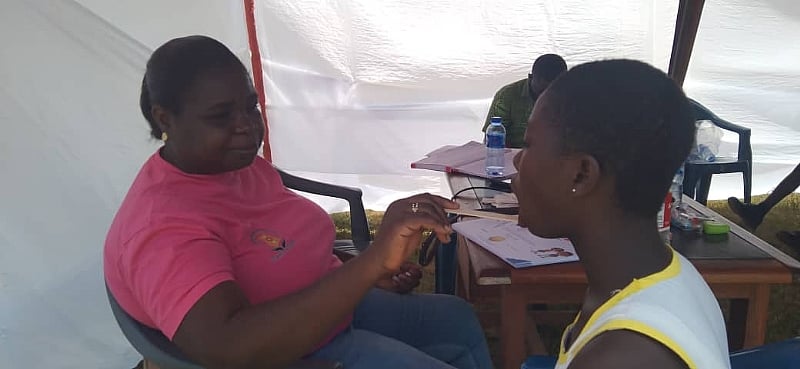World Vision Ghana, in partnership with Unilever Ghana and the Ghana Health Service, spearheaded a comprehensive oral health initiative targeting school children in the Fanteakwa South and North districts of Ghana’s Eastern Region. This collaborative effort involved free oral health screenings and the distribution of dental hygiene products, including toothpaste and toothbrushes, generously provided by Pepsodent and World Vision. The program also incorporated educational sessions designed to empower children with the knowledge and skills necessary to maintain optimal oral health. This initiative aligns with World Vision’s broader commitment to improving the overall well-being of children in rural communities by addressing a critical yet often overlooked aspect of health – dental hygiene. By investing in preventative care and education, World Vision aims to foster healthier living conditions and contribute to a brighter future for these children.
The importance of this initiative was underscored by Jean-Claude Mukadi, the Interim National Director of World Vision Ghana, who attended the screening program at Adjiekrom. He reiterated World Vision’s dedication to supporting vulnerable communities and promoting good oral hygiene practices among children. Mukadi emphasized the link between oral health and overall well-being, noting that proper dental care not only prevents disease but also contributes to increased confidence and improved quality of life. He highlighted the significance of regular dental check-ups, encouraging parents to ensure their children visit a dentist at least annually to address any potential issues early on, preventing minor cavities from developing into more serious problems. This proactive approach aims to mitigate the long-term impact of dental neglect, which can lead to extensive and costly treatments later in life.
Mukadi’s presence at the event demonstrated World Vision’s commitment to working alongside partners and stakeholders to achieve sustainable improvements in oral health within these communities. The collaborative nature of this initiative, involving both corporate and government entities, showcases the power of partnerships in addressing public health challenges. By pooling resources and expertise, World Vision, Unilever Ghana, and the Ghana Health Service are effectively reaching a wider population and maximizing the impact of their efforts. This collaborative model serves as an example of how public-private partnerships can be leveraged to improve health outcomes in underserved regions.
Local leaders and community members expressed their gratitude for World Vision’s intervention and highlighted the prevailing challenges in maintaining oral hygiene within their communities. The DaadeMantse of Adjiekrom, a local traditional leader, expressed his appreciation for World Vision’s efforts in bringing oral health education and resources to the forefront. Reflecting on past practices, he recalled a time when traditional methods, such as using plantain sticks and ground charcoal, were the norm for dental cleaning. He acknowledged the progress made with the availability of modern dental products and lauded World Vision’s contribution to educating and equipping children with the tools they need for a healthy future. This underscores the generational shift in oral hygiene practices and the positive impact of introducing contemporary methods to these communities.
The DaadeMantse also appealed to the government to extend its support by providing free toothbrushes to schools in underserved communities, mirroring the government’s commitment to supplying free sanitary pads to young girls. This request highlights the need for sustained government intervention to ensure equitable access to essential hygiene products for all children. He sees this initiative as a crucial step in promoting oral health equity and ensuring that all children, regardless of their socioeconomic background, have the opportunity to maintain optimal oral hygiene. The call for government support emphasizes the importance of integrating oral health into broader public health policies and programs.
Rev. Peter Ohene Tetteh, Chairman of the Local Council of Churches in the Fanteakwa South District, brought to light another concerning practice – the sharing of toothbrushes among children within some households. He strongly discouraged this practice, emphasizing the importance of individual toothbrushes for maintaining proper hygiene and preventing the spread of oral diseases. This observation reveals the socio-economic realities faced by some families and the need for continued education and awareness campaigns to promote healthy habits. His plea underscores the crucial role of community leaders and religious figures in disseminating health information and influencing behavioral change within their communities. The insights shared by both the DaadeMantse and Rev. Tetteh illustrate the multifaceted challenges related to oral hygiene in these districts and emphasize the need for a comprehensive approach that includes education, resource provision, and sustained community engagement.














